Recent Water Damage Posts
Water Damage Restoration
1/3/2024 (Permalink)
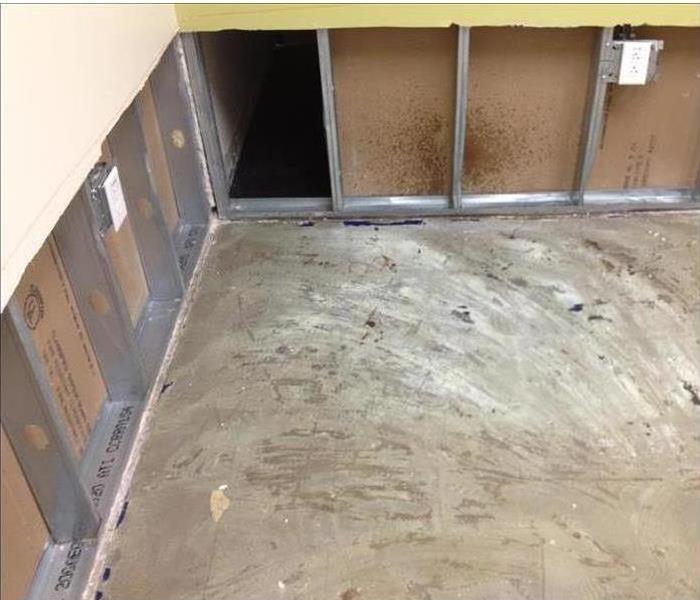 Water damage restoration in Arcadia
Water damage restoration in Arcadia
Water damage to your Arcadia, OK, home can be a major problem. Fortunately, acting quickly can help prevent further damage, including mold growth.
Causes
There are many ways water can damage your home. The following are some of the most common:
- Broken pipes
- Leaking roof
- Storm damage
- Malfunctioning appliances
Homeowner's insurance will cover most types of damage caused by water, but for damage caused by flooding you will need flood insurance. Before any damage occurs, talk to your insurance agent to make sure you have the right type of insurance and the right amount of coverage for your home and belongings.
Restoration Process
If your home suffers water damage, remember that mold can begin to grow within 24 hours. It is important to begin the water cleanup process as soon as possible. First, extract all standing water using a specialized pump or vacuum. If necessary, you can also use buckets to scoop out the water. After this step, there will still be water in porous items, such as carpeting and upholstery. Dry out the remaining water using fans and dehumidifiers. If the humidity outside is low, you can open windows and doors to increase air flow. Next, clean and sanitize all affected surfaces. The source of the water will determine the type of cleaner that you should use. Throw out everything that cannot be fully cleaned and dried. You may need to consult a professional to make this determination. Depending on the extent of the damage and amount of water present, the drying process can take days or weeks. Finally, repair and replace all damaged items. Some repairs you may be able to do yourself, but delicate items, such as antiques and electronics, may need professional restoration.
Cleaning up water damage can be a complex process. If you feel overwhelmed, a certified restoration company can help you get your home back to normal quickly and safely.
Preparing for the Insurance Adjuster's Visit After a Sudden Pipe Break or Flood
6/26/2023 (Permalink)
 The insurance adjuster works closely with our team from start to finish.
The insurance adjuster works closely with our team from start to finish.
Preparing for the Insurance Adjuster's Visit After a Sudden Pipe Break or Flood
The first part of the insurance claim process is the home adjuster visit. These visits validate the claim and offer an estimate for restoration value. Therefore, to ensure you receive the funds you need following a water disaster like a pipe break, it is necessary to follow the appropriate steps.
- Mitigate damage
- Document loss
- Organize and categorize
Mitigate Damage
The first step is to mitigate any further damage. You can do this, depending on the severity of the loss, through DIY methods or by calling a disaster restoration company in Edmond, OK. These companies will likely have mitigation services available around the clock.
Document Loss
Next, once you know that further loss is unlikely, you can begin documenting the damage. For example, take photos of water damage and property that was ruined in the incident. A home adjuster moves quickly from site to site, so having damaged or irrecoverable items photographed ensures that nothing is missed on their visit.
Organize and Categorize
Next, once you have photographic evidence, find any receipts or service bills to demonstrate the value and care of the items affected by the flood. Documenting and organizing this information is another way of making life easier for the adjuster and ensuring that you get the coverage you need to make your home and yourself whole again.
Many people view a home adjuster as an enemy, someone out to cancel payments and make sure that you cannot recover from a disaster. However, nothing could be further from the truth. Yes, their job is to minimize costs to their company, but it is also to make sure that you get what you deserve. Therefore, when a disaster strikes, don't get angry with an adjuster who keeps asking questions. Instead, find a way to reduce their questions through well-documented scenes and show them how prepared you are for their visit.
Water Damage and the Impact it has On Your Home
12/12/2022 (Permalink)
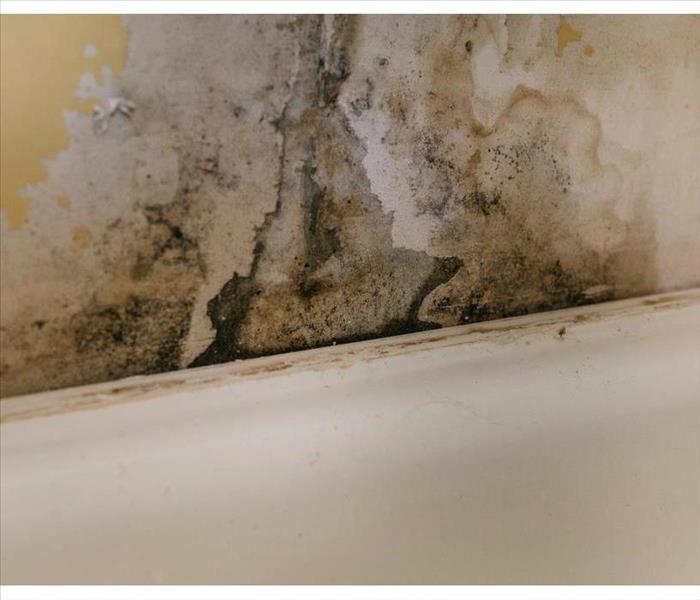 Water damage can cause mold to grow.
Water damage can cause mold to grow.
Water damage is one of the most common and most devastating problems in homes. Water damage can occur from a leaking pipe, broken appliance, or even heavy rain. As soon as you notice the signs of water damage in your home, it’s important to act immediately. The longer you wait to deal with water damage, the more likely it is that permanent structural damage could occur—and that means more money out of your pocket!
What are the effects of water damage?
Water damage can cause a number of problems. Mold, rot, and electrical short circuits are all serious concerns that you will want to address immediately. If left untreated for too long, mold and rot can cause structural damage to your home or business.
Structural damage caused by water is often irreversible; meaning that it cannot be reversed or fixed without major renovations. This can be an expensive process that could potentially cost tens of thousands of dollars depending on the severity of the problem and how much structural work needs to be done.
Water damages building materials.
In addition to the damage caused by water, there are other ways that your building materials can be affected by moisture. When it comes to wood—and many other building materials—moisture causes them to swell and crack. This can lead to a variety of problems:
- Moldy, rotten or warped walls and ceiling panels
- Discolored walls or ceiling panels (from mold growth)
- Warped or damaged floorboards and drywall
Growth of mold.
If you've ever had to deal with a leaky pipe or a broken sink, then you know that water is no friend to your home. Water damage can cause everything from mold growth to the growth of bacteria and viruses.
When it comes to mold, it doesn't take much for it to develop. Less than 48 hours in damp conditions and just 24 hours in wet ones. In fact, all you need are three basic ingredients: moisture (from flooding), food sources (like paper products) and warmth. If these conditions exist for too long without proper ventilation, then your chances of facing an outbreak will increase dramatically.
Mold is especially common during springtime because of its ability to grow on almost any surface--and once it starts growing, there's no stopping it!
Structural damage.
The structural integrity of your home can be damaged in many ways by water damage. Water can cause wood to rot and become moldy, causing drywall to swell and crumble. It can also cause concrete to crack and crumble, or it can rust metal.
If you think that any of these things might be happening in your home, it’s best to contact a water damage restoration company right away!
Water damage is a serious issue that can lead to permanent damage to your home and valuables. If you believe that your home has been damaged by water, it’s important to contact an experienced restoration company as soon as possible. The sooner they arrive at the scene of the crime (so to speak), the less likely it will be that things get worse than they already are.
What To Do After a Toilet Overflow?
11/5/2022 (Permalink)
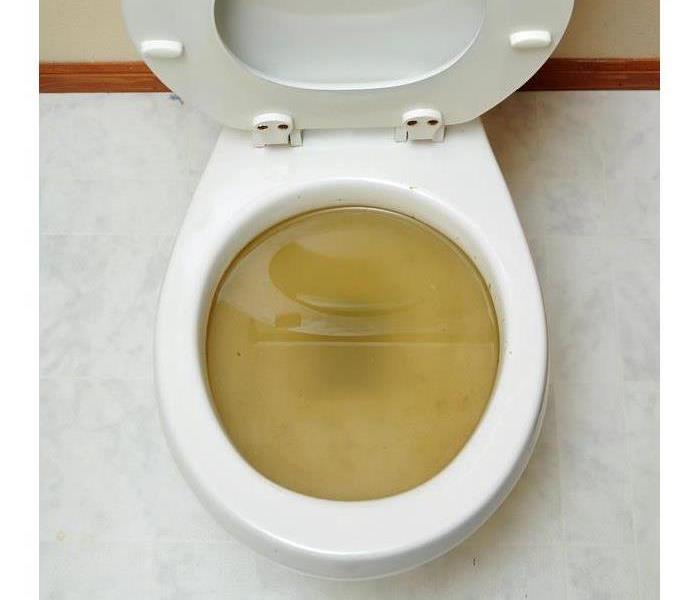 Toilet overflows can happen to anyone, but you can prevent them.
Toilet overflows can happen to anyone, but you can prevent them.
How Should a Toilet Overflow Be Handled?
If your toilet overflows, it can be a very unpleasant scenario. It’s important to understand what caused the overflow and what you need to do to fix it. In many cases, there will be no damage and you can just wait for the water to recede and then clean up any mess that was made by the overflow. However, if there is damage or if your home had flooded due to an overflowing toilet it is best to contact a professional right away so they can assess the situation and make recommendations for how best to proceed with repairs.
Turn Off the Water Supply
Turning off this valve won't necessarily stop all of the water right away; depending on how many toilets have overflowed, some may continue flowing out of their bowls until they're empty enough that gravity can take care of things. Remember, if any part of your house has flooded—and even if it hasn't—that means there's enough standing water for bacteria and mold growth. Make sure everyone knows where these shutoff valves are located just in case something else happens!
Remove Excess Water
If you have a wet/dry vacuum, this can be an excellent tool to remove excess water from your floor. If you do not have one, use a shop vac or mop in place of the wet/dry vacuum. For the shop vac method, simply use the hose attachment and suck up any standing water on your flooring. Make sure to rinse off this attachment when finished so that no residual grime remains on it—this can be done by using warm water and soap with some soft scrubbing.
What Can You Do If Your Toilet Overflows?
If you don't want to deal with the mess yourself, or if the damage is too extensive for you to handle on your own, call a professional. Here are some of the services that may be able to help:
Plumbers. These professionals specialize in drain cleaning and repair, and they can unclog any clogged drains in your home—including those caused by overflowing toilets.
Restoration companies. Restoration companies have equipment specialized for sewer clean-ups and repairs, so they're equipped to handle even large overflows that go all the way down into sewer lines and beyond! They will pump out any standing water left behind by an overflow situation then disinfect everything so there's no risk of disease spreading throughout your home or office building.
Toilet overflows can happen to anyone, but you can prevent them by keeping your plumbing in good working order. If you have a toilet overflow, it’s important to act quickly and call a professional so they can fix the problem before it becomes worse. Our SERVPRO of Edmond team can assist you with all your water and sewage damage cleanup and restoration needs. If disaster strikes, don’t hesitate and give our SERVPRO team a call today!
What To Expect During the Water Damage Cleanup Process
6/27/2022 (Permalink)
Water Damage Cleanup Process
When a major water event impacts your business space, you not only have to worry about restoring the building but also all the items within the space. This can be a delicate task that water damage mitigation professionals should handle, as there are many important factors involved. Here is what you can expect during the clean-up process should your Arcadia, OK, building be impacted by water.
Extensive Hygiene Standards for Those Cleaning a Flooded Company
If a natural flood or broken pipe infiltrates a space with contaminated water, experts must take appropriate precautions to ensure their own safety, as this water can be harmful upon exposure or ingestion. Very strict hygiene standards are on the table for anyone cleaning the space. These include:
- Handwashing immediately after handling wastewater
- Wearing protective gear like gloves, boots, goggles and face shields
- Avoiding touching your face while handling wastewater
- Seeking immediate medical help if they experience any signs of illness
Mold Remediation
A flooded company is at large risk of mold developing within its walls given the high moisture levels. Professionals will use industry-standard techniques and products to clean all impacted surfaces to eliminate the growth of mold and bacteria. This is a key step for maintaining the cleanliness of a building and the health of its occupants.
Proper Dry Cleaning
Once the water has been removed and surfaces cleaned, experts are tasked with drying the entire space and any items that retained moisture. This process will be closely monitored to make sure even the smallest water particles don't remain. From here, necessary repairs can be made to restore the building to its previous condition.
The water cleanup process is complex with strict standards. Any flooded company will see water damage experts follow many protocols for hygiene, disinfect the space to prevent mold and monitor the drying process to get water out of all surfaces and items.
3 Types of Water in a Home Spill
5/18/2022 (Permalink)
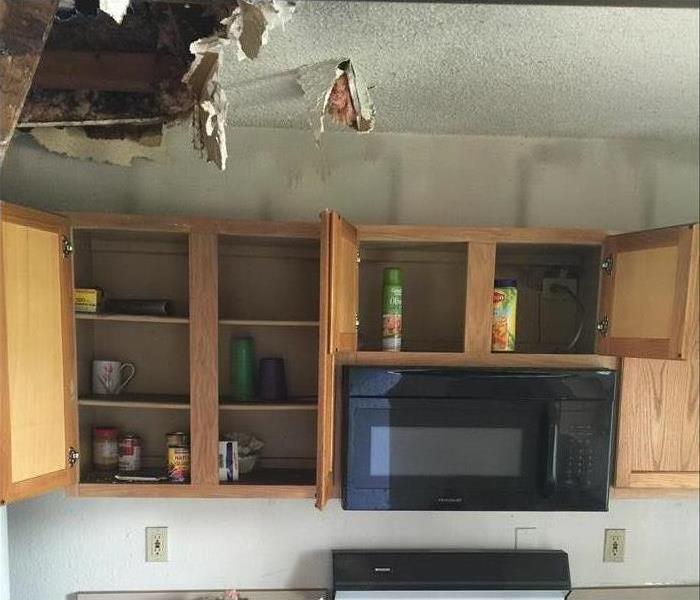 The ceiling collapsed after it became saturated with water due to a pipe leak upstairs.
The ceiling collapsed after it became saturated with water due to a pipe leak upstairs.
Water Categories
A home water spill can be a disappointing and confusing experience, especially if it is your first time. All of a sudden, you have a distressing quantity of liquid loose in your home in Oak Tree, OK. Depending upon the situation, it could even continue to release more water into a room. Your first step should be to turn off the water to that pipe or appliance. If you are dealing with contaminated water, you should immediately call for the services of a professional water damage mitigation team in your area. The company will dispatch a crew to your area to get the situation under control.
A water spill could involve any of three types of water. It is important to know a little about each one.
1. Clean Water
This is likely to come in from the home through a supply line. It is clear, drinkable water and usually comes out of taps in your kitchen and bathrooms. While it can still cause damage to your home, it is not always an emergency.
2. Gray Water
This is mildly contaminated water and has a gray appearance that comes from impurities in the water. Liquid from a washing machine or a dishwashing machine would fall into this category, as would water from a toilet bowl provided there are no feces present. This water can do damage to household items and structures much quicker than clean water and it should be cleaned up as soon as possible.
3. Black Water
This refers to water from a sewage spill or from gray water that has sat around for a long time. It usually looks dark and nasty and has unpleasant odors. It should be treated as an emergency and cleanup should be undertaken by trained professionals with appropriate equipment.
While contaminated water is always a serious concern, all water spills in your home require careful cleanup. Some situations call for professional services.
How to Clean the Things in Your Commercial Building After a Flood
3/14/2022 (Permalink)
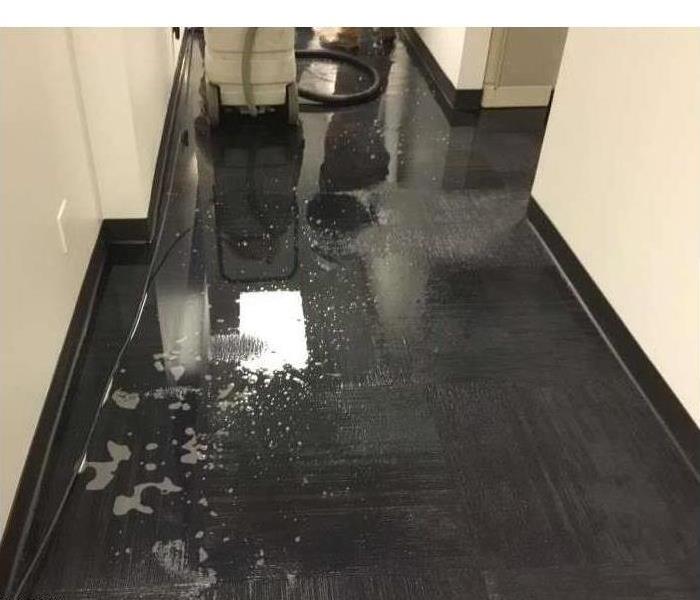 Commercial water damage in Waterloo, OK.
Commercial water damage in Waterloo, OK.
How to Clean Up After a Flood at Your Commercial Building
If a broken pipe floods your business in Waterloo, OK, you may know to call a professional cleanup company to restore your building. However, the structure isn’t the only thing that gets damaged in a flooded company. How should you take care of the belongings in the building? First, sort the belongings into three categories:
- Unsalvageable
- Salvageable and porous
- Salvageable and nonporous
Once you decide which category an item falls into, you can know what to do with it. Below is a simple guide to help you get started.
Unsalvageable
While you can save many things in a flooded company, some belongings may be beyond repair. Furthermore, certain things may not be worth the time and effort to salvage. While you may not try to restore these things, there are still a few things you should do.
Most importantly, always seal unsalvageable items in plastic bags. Since they can still grow and spread mold, it’s important to keep them from doing so.
Salvageable and Porous
Porous items include anything made from cloth, such as upholstery and clothing. In this case, dry cleaning is a great option. For furniture, you may choose to air dry damaged items. Then, be sure to treat it with specialized cleaners.
If, after a while, you still have a mildew smell in the furniture, you can use a vinegar solution to remove the smell. If you’re not sure how to handle these porous surfaces, you can hire a professional cleaning crew in Waterloo, OK to help.
Salvageable and Nonporous
Desks, windows, and other nonporous surfaces are relatively easy to clean and restore. First, remove the excess water on the item. Then, use a bleach-based cleaner to remove any mold or mildew. Be sure to wipe the whole object with this solution. Then allow the item to dry thoroughly.
A flood caused by a broken pipe can be difficult to clean up. However, with a professional restoration company and these tips, you can make it feel like nothing ever happened.
How To Handle Broken or Bursting Pipes
2/9/2022 (Permalink)
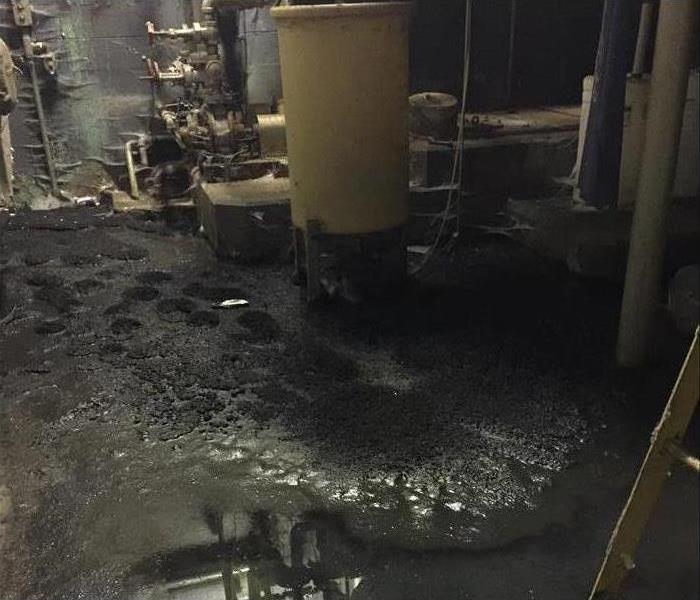 This home was damaged by sewage water.
This home was damaged by sewage water.
Fixing Broken Pipes
Dealing with water damage in Oklahoma City, OK, is never fun. Bursting pipes can lead to flooding, which can cause a lot of problems in your home. Luckily, there are a few things you can do to fix a broken pipe quickly so that the damage is lessened.
Keep Pipes in Good Condition
The best way to handle flooding is to keep it from ever happening in the first place. While there’s not always a way to prevent bursting pipes, there are measures you can take to help keep pipes in good condition and lower their chances of breaking:
- Keeping pipes from freezing
- Checking pipes regularly
- Turning off water while on vacation
Act Fast When Things Go Wrong
Even though you may take good care of your pipes, things can still occasionally go wrong. If flooding occurs, one of the most important things is to act fast. The more water that floods into your home, the more damage there is to be fixed and cleaned up. A damage restoration company can help you handle bursting pipes and the aftermath of flooding. The faster everything is dried out, the less risks there are of unpleasant aftereffects such as mold and odors.
Identify What’s Happening
There are several things to be identified when flooding occurs. You not only need to figure out where the water is physically coming from but also decide if it is clean water, such as water from a tap, or black water, such as sewage. A restoration company can help you handle all types of water and hopefully get the problem taken care of quickly.
Bursting pipes can cause a lot of problems, but you can get them fixed without too much trouble by keeping pipes in good condition, acting fast, and hiring a professional company to help you. If repairs are done quickly and well, you should be able to avoid other problems, such as mold, later on.
Bathroom Water Supply Lines Do Not Last Forever
12/29/2021 (Permalink)
 Water supply lines are not always avoidable.
Water supply lines are not always avoidable.
Bathroom Water Supply Lines Do Not Last Forever
All toilet water connections have a hose that connects the toilet to the shutoff valve. Most often, the hose consists of a shiny stainless-steel braid surrounding a polymer tube. It is a masterpiece of simplicity.
- The internal polymer tube contains the flowing water.
- The stainless-steel exterior makes it rustproof and gives it strength.
- The braid gives it flexibility.
It sounds indestructible. Why would we ever be concerned about supply line damage? How could it ever be the source of a bathroom leak?
Your Supply Line May Be Rustproof, but It's Not Immune to Chlorine
If there is a public water supply in Waterloo, OK, your water is probably chlorinated. Cleaning products often contain chlorine. We all know how it smells. If you pay close attention, you can probably detect a faint smell of chlorine in your bathroom.
The process whereby chlorine causes supply line damage is simple. Cold water passes through the water supply line. Moisture from the air condenses on the stainless steel and interacts with the chlorine in the air. The result is that the condensation becomes a very mild solution of hydrochloric acid. It may not be strong, but it is eating away at your stainless-steel all day, every day. Eventually, the wires in the braid break and puncture the polymer interior causing a supply line leak.
Replace Your $20 Water Supply Hose and Save Thousands in Repairs
There are no official guidelines for how long your braided water supply hose should last. However, you should consider replacing the supply line if
- You can see discolored areas on the stainless-steel braid.
- You can see or feel broken strands of wire, particularly near the couplings.
- You or your plumber is performing maintenance on the toilet.
Supply Line Damage Is Not Always Avoidable
When your supply line fails, there is going to be significant water damage that needs immediate attention. That’s why you will want to bring in the best water damage remediation specialists available.
Before You Pitch Water-Damaged Carpet, Read This
11/23/2021 (Permalink)
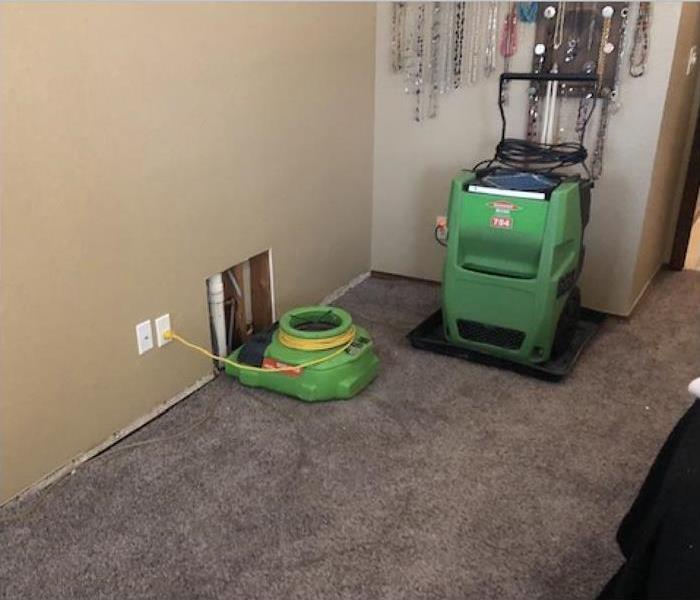 Water damage cleanup and restoration in Oak Tree, OK.
Water damage cleanup and restoration in Oak Tree, OK.
Read This Before You Pitch Water-Damaged Carpet
Carpet is an essential part of many homes. Not only does carpeting improve the look of different spaces throughout the home, but it also makes most rooms feel more comfortable. Often, homeowners choose to install carpeting in refinished basements to convert them into livable spaces. These areas, though, are at increased risk of water damage from a pipe break or other source. If your carpeting has sustained damage during a flood, you may not have to throw it away.
Consider the Source
As you likely know, carpeting is made from a few materials. Some textiles are fertile breeding grounds for unpleasant contaminants you don’t want inside your home. These include the following:
Of course, flood waters can also introduce foul odors and unattractive stains to your home’s rug. When you are thinking about whether you remove your carpeting, you must consider the source of the flooding. Often, clean-water floods from a pipe break or another uncontaminated source don’t destroy carpeting. If your flood contains black water, sewage or other polluted water, however, you likely need to completely remove your carpeting.
Work With a Knowledgeable Remediation Service
Even minor floods can cause extreme damage to the interior of a home in Oak Tree, OK. To ensure your home doesn’t sustain lasting damage, you need access to the right information, equipment and personnel. Often, contracting with a restoration service is probably your best bet. The professionals who work in the industry know when to clean carpeting and when to remove it altogether.
If you want to get the most out of your Oak Tree, OK, home, you need a strategy for restoring its condition after a pipe break or other flood. While your initial concern is likely with fprotecting your valued treasures and other personal belongings, you can’t forget about your home’s carpeting. Fortunately, if you love your carpeting, you may not have to pitch it following a flood.
Gray Matters: Category 2 Water Damage
9/6/2021 (Permalink)
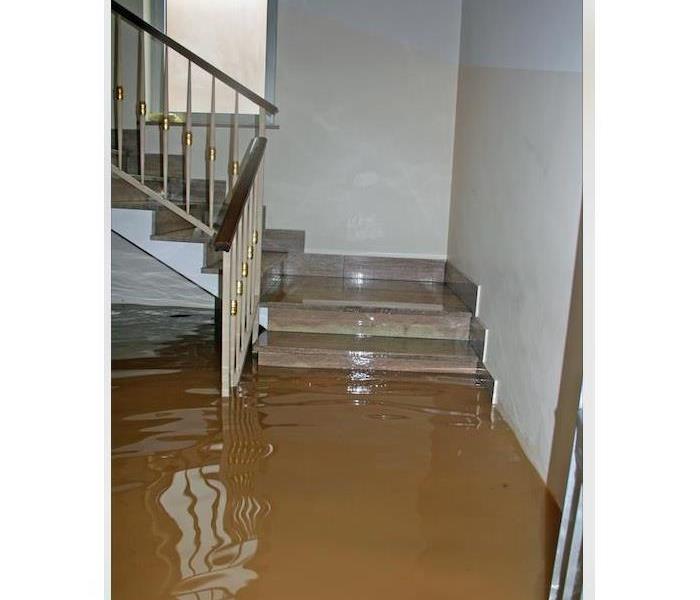 Some water pipe repair is clean water, but more likely than not, the water damage contamination level is going to be at least in Category 2.
Some water pipe repair is clean water, but more likely than not, the water damage contamination level is going to be at least in Category 2.
Category 2 water, or gray water, is the middle level on the water contamination scale. It may have unsafe levels of bacteria and might cause people who ingest it some discomfort. It may also contain chemicals from the surfaces it touches. If you need water pipe repair in Edmond, OK, it is likely that the water you are dealing with is Category 2 water.
Typical Sources
When your business is flooded by Category 2 water, it may have come from the following sources:
• Dishwasher leaks in the company kitchen
• Failure of the sump pump in the basement
• Hydrostatic pressure on the foundation
• Overflowing toilet (clean or with urine only)
It is not advisable to drink water from these sources as they are expected to have certain levels of contaminants in them. It's not, however, as contaminated as Category 3 water, which includes sewage and floodwater.
Other Instances
Some instances of water pipe repair may turn into dealing with gray water. Unless water comes directly out of a broken pipe, it is likely to fall within the Category 2 contamination level. Once water is out in the open or in contact with various materials, it doesn't stay clean for long. For example, suppose a supply line breaks on the second floor and it is not discovered until the water is seeping through the ceiling of the first floor to the front desk. The water from the supply line is Category 1. The water dripping into the receptionist's coffee, however, is Category 2. It has gone through a floor, insulation, and ceiling tiles and now is no longer clean. The receptionist should definitely get a new cup right after phoning remediation services, and that remediation will likely include a disinfection step.
Some water pipe repair is clean water, but more likely than not, the water damage contamination level is going to be at least in Category 2. This means that not only does the area need to be dried but also sanitized. Remediation specialists can run tests so that you know what category the water falls under for sure.
Common Reasons for Shower Leaks
6/29/2021 (Permalink)
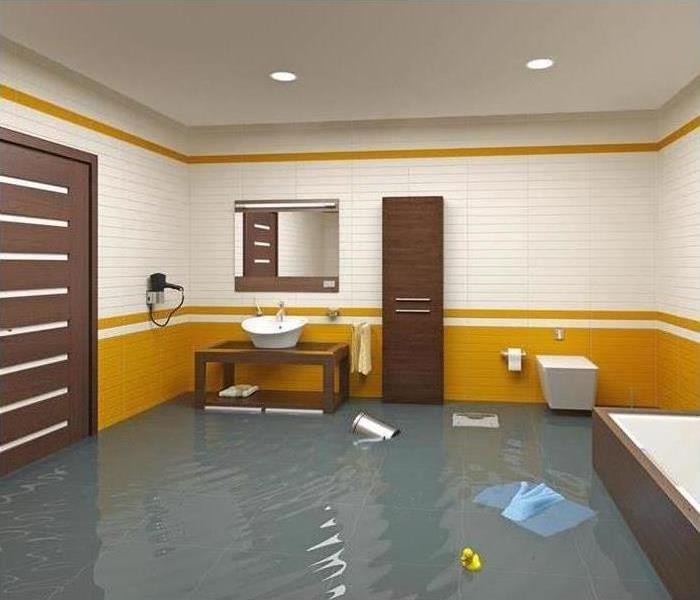 Inspect your bathroom for any leaks and fix them swiftly.
Inspect your bathroom for any leaks and fix them swiftly.
Common Reasons For Leakage
Due to the large amounts of water running through bathrooms every day, it makes sense that there are often leaks in the bathroom appliances. If you notice excess water pooling or are concerned that there might be water damage or mold in the room, you could be dealing with a shower or bathtub leak.
1. Old Shower Head
Over time, your shower head assembly can wear down and become faulty. If the leaking water is coming from the faucet of your showerhead, try replacing it. However, it’s important to note that the entire assembly might be faulty and could require the replacement of the shower system.
2. Broken Liner Seal
If you are dealing with a shower pan leak, try checking the liner that fits around the pan. Sometimes, these seals are improperly installed and do not protect your floor. If there is a cut or crack in your seal, water can drip into your subfloor and damage your home. If you think this is the case, replace the liner seal with one that is entirely leak-proof.
3. Faulty Drain
Often, the drain is responsible for a shower or bathtub leak. Sometimes the pipes beneath the drain can’t drain all the water without leaking. This might require a plumber. Another reason why your drain might leak is that of a faulty seal around the drain. You can remove the drain and apply the plumber’s putty all around the area to prevent further damage.
There are many ways a bathtub leak can occur. Age and faulty appliances are usually the culprits of a bad leakage. No matter the reason, it’s important to quickly clean up the water and restore anything that suffered water damage. If left unnoticed, the damage can increase and might eventually form mold.
To secure your home and prevent future damage in Edmond, OK, inspect your bathroom for any leaks and fix them swiftly.
Tips To Help You Prepare for an Insurance Adjuster's Visit
3/9/2021 (Permalink)
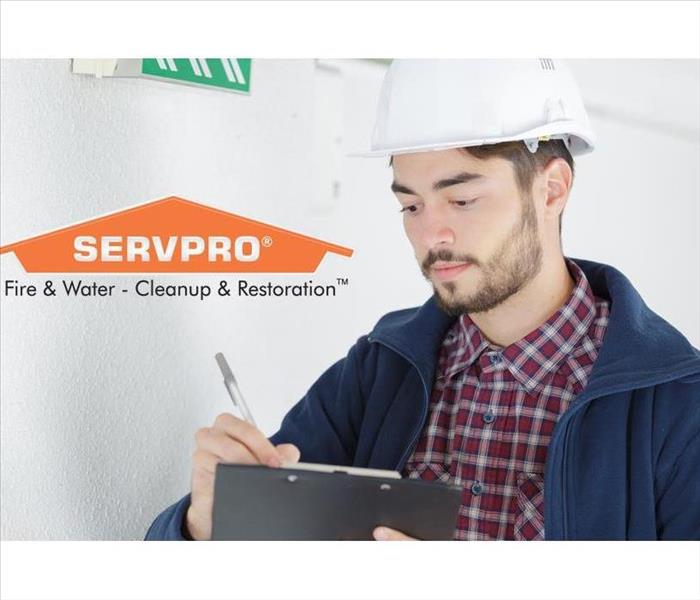 The insurance adjuster works closely with our team from start to finish.
The insurance adjuster works closely with our team from start to finish.
When a flood causes significant damage to your home in Luther, OK, your insurance company's home adjuster will schedule a site inspection to gather the information necessary to process your insurance claim. You can plan for this visit in the following ways.
Create a List of Losses
Before you begin the cleanup process, go through your belongings and make a complete list of irreparable or severely damaged items, including:
- Clothing
- Furniture
- Carpets
- Window Coverings
- Electronics
- Photos
Attaching photos of as many items as possible to your list will substantiate your losses. You can also provide written descriptions if taking photos is impossible because of your belongings' destruction.
Inspect Your Home Carefully
Check your home for damage to its foundation, garage, swimming pool or any of its structural parts and prepare to discuss any abnormalities with the home adjuster. Identifying pre-existing defects or sudden damage preceding a flood can help define the scope of your claim.
Research Contractors
Acquiring quotes from at least three licensed contractors to clean your home or restore your belongings will facilitate the claim process. Ask these vendors to provide details describing their materials and methods and a working timeline your insurance provider can review before confirming coverage. A reliable disaster recovery service will not start working before receiving clearance from your insurance company.
Gather Documents and Receipts
Sorting relevant paperwork and assembling it into a single file will prevent unnecessary delays settling your claim. In addition to an itemized list of your belonging with photos and contractor quotes, include item purchase and moving expense receipts, written art appraisals or any documents that support your claim and provide answers to potential questions. Be sure to include all of your contact information on the paperwork to ensure you are reachable.
If your home in Luther, OK experiences a flood, a reputable flood restoration company can work with your insurance company's home adjuster to facilitate your insurance claim.
Prevent Toilet Overflow Inside Your Business With These Tips
2/10/2021 (Permalink)
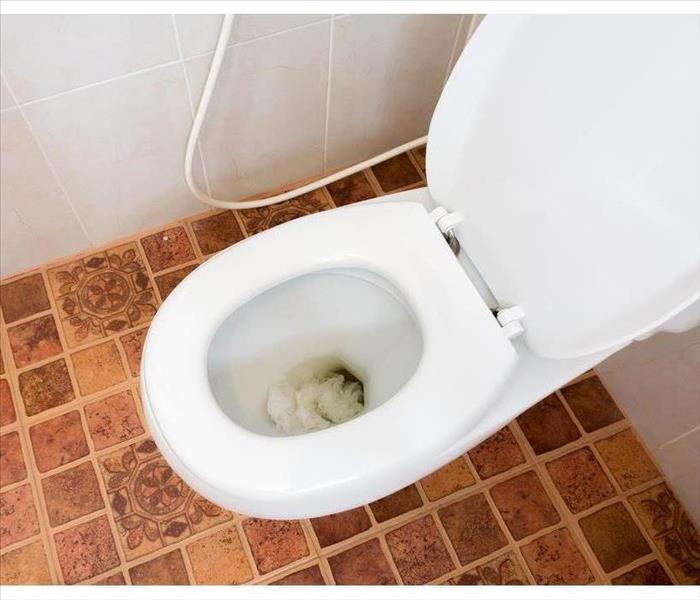 Use this advice to prevent several clogged toilet cases and avoid high costs.
Use this advice to prevent several clogged toilet cases and avoid high costs.
A clogged toilet at home is already a problem, but it increases when it occurs to multiple units at your Edmond, OK, business. It is difficult to handle each one individually, and even some overflow is enough to damage the building. You can prevent many cases of toilet blockage and future issues by following these bathroom maintenance tips.
Use Improved Products
The quality of the products used on the toilets is important, as they can affect whether they get clogged easily. For example, using a thinner toilet paper can help since users will sometimes flush it down in large quantities. A thin material will disintegrate faster and flush down with ease. Additionally, avoid chemical drain and tank cleaners whenever possible. These products can damage the components and create clogs and other issues. Use mechanical cleansers like plungers or augers instead.
Change User Behavior
While you cannot control how the users act, you can encourage better behavior. Prevent a clogged toilet by putting up signage that encourages practices such as:
- Avoiding the flush of any non-toilet paper products
- Flushing down only small objects
- Performing a double flush after any use
- Treating the equipment with respect
There are also more subtle ways to influence behavior. For instance, installing a wider wastebasket near a toilet can convince a user to throw away any non-plumbing friendly items to it instead of disposing of it via the toilet.
Conduct Regular Inspections
Just as any piece of equipment in your facility, the toilets and other bathroom appliances need constant inspections to ensure they are working properly. Technicians should inspect the toilets at least twice a year. It is also important to inspect the sewage system since a toilet overflow can be the sign of a bigger problem, such as tree roots blocking the pipes. Inspections and preventative maintenance can prevent you from calling a commercial remediation team to repair water damage.
Preventing blockage formation within your business's toilets can be overwhelming, but not impossible. Use this advice to prevent several clogged toilet cases and avoid high costs.
4 Key Points for Handling a Broken Pipe
12/29/2020 (Permalink)
 Water removal in Oak Tree, OK
Water removal in Oak Tree, OK
Here Are Four Key Points To Handling A Broken Pipe
A broken pipe can be a major headache in Oak Tree, OK, and it is important to know what to do if you find one in your home. From dealing with water removal to calling your insurance provider, the process can be overwhelming. However, being prepared and understanding how to respond to this situation can prevent a small flood from escalating quickly and turning into a costly nightmare.
1. Take Action Immediately
There is no time to spare when dealing with water damage. Standing water can damage your property quickly and can also lead to mold and mildew if left untreated.
2. Remove the Water
Turn off the main water valve to stop the flood and prevent any additional water from pouring into your home. Remove any standing water from the floor by using towels or a mop to absorb it.
3. Contact Your Insurance Provider
Notify your insurance company immediately to file a claim. Water damage is usually included in your insurance coverage if the damage is due to an unexpected event, such as a collapsed or broken pipe, as opposed to a slow leak from wear and tear. Your insurance provider will tell you the specifics of what is covered under your policy.
4. Call for Help
Do not attempt to fix the damage on your own. Enlist the help of a plumber to fix the broken pipe and call a professional water damage and restoration company to handle cleanup. They have professional equipment for cleaning, drying, and disinfecting the affected area. In addition, they will restore your home to its pre-flood condition.
Broken pipes and flood damage are a serious issue, but you can mitigate the damage of you seek help immediately. Protect your home by performing routine maintenance and keep the information of a good plumber and restoration service on hand. The last thing you should do is procrastinate. Waiting to take action can lead to additional damage and costly repairs.
3 Things You Should Know About Water Damage
10/7/2020 (Permalink)
 Water cleanup services in Oak Tree, OK
Water cleanup services in Oak Tree, OK
Make Sure Your Home Is Protected By Water Damage
If you have had a pipe burst or other water inundation event in your Oak Tree, OK, home, you may be unsure what steps you need to take. Depending on the water source, you may even require cleanup equipment that you don't have on hand. This can be difficult for any homeowner. If you have no experience with water damage, there are a few things you should know in order to clean up properly.
1. Time Is of the Essence
The sooner you clear water that has accumulated after flooding, the sooner you can focus on drying and airing out affected areas. Mold can begin to set in as little as 24-48 hours after your surfaces have been exposed to water. Because water exposure is harmful to electronics, paper, and certain building materials, it is vital that you remove it from your home as soon as possible.
2. Secondary Damage Is Often More Damaging Than Initial Water Exposure
While lost files and damaged furniture are a pain to replace, damage caused by mold and water infiltration can be much more insidious. Mold that grows at or below the water line during a flood can spread through the release of airborne spores. Further, walls and support structures that are exposed to water may become weakened if not properly dried out.
3. Restoration Isn't the End of The Process
After removing floodwater from a pipe burst or other event, you should clear humidity from your home as efficiently as possible. Doing this properly can be difficult, so it is always recommended that you contact a water restoration professional who can measure the humidity in the air until it is no longer concerning. Even though your home has been restored, you should periodically check to see if there has been an increase in moisture or humidity.
Having a pipe burst or flood in your home can be physically and emotionally draining. Make sure that your home is protected in the future by taking the necessary steps toward recovery now.
Why Your Water Heater Is Making Noise
9/17/2020 (Permalink)
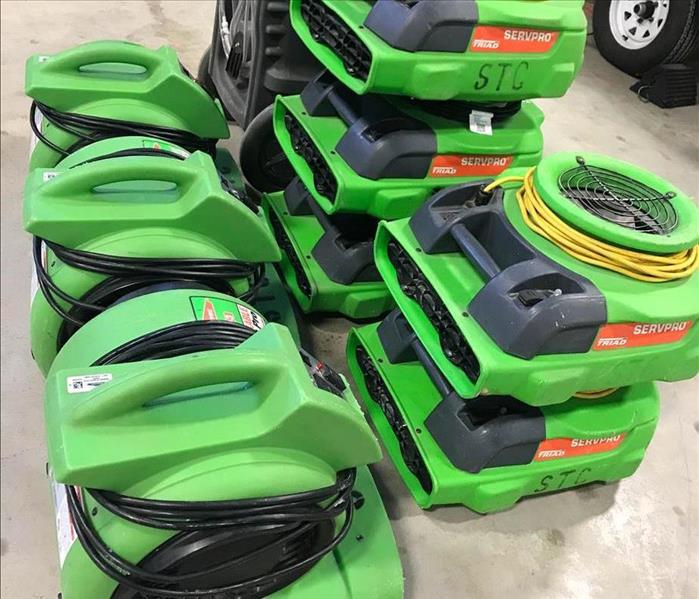 When you reconnect everything, leave your hot water faucets open until water runs to prevent air from being trapped.
When you reconnect everything, leave your hot water faucets open until water runs to prevent air from being trapped.
Houses in Edmond, OK, have a tendency to make all kinds of noises that are never fully understood. Sometimes it's the house settling, other times it could be pipes expanding. If you hear noises coming from your water heater, pay attention. It could be trying to tell you something.
Noises Coming From Your Water Heater
Sediment collects in water heaters. When your water heater makes popping noises, it's probably the sentiment being pushed up as the heat causes the water to rise. Cleaning the element inside the water heater can resolve this issue, and it should be cleaned as sediment can cause maintenance issues if allowed to build up.
If your water heater starts making a knocking sound, then you have what is known as water hammering. This is the movement of the pipes outside your water heater moving around when water entering or leaving the tank is suddenly shut off. Installing a water hammer arrestor can cure the issue.
If you ever experience a water heater leak, be sure to clean up any standing water right away. The longer water stands, the more severe the damage. Call a professional restoration company if water has been sitting for a prolonged period of time.
Regular Maintenance
Water heaters should be maintained annually to prevent damage that could occur from buildup in the tank. The maintenance will include a water heater flush with a deliming solution. This routine maintenance can extend the life of your unit as well as save on energy costs.
Flushing your water heater is an easy process. Turn off the water heater and allow the water to cool.
Turn off the water supply and connect a hose to your tanks drain valve and lead it outside.
Open all the hot water faucets to allow for a faster drain. When the tank is empty, turn the cold water supply back on to flush out the sediment at the bottom.
When you reconnect everything, leave your hot water faucets open until water runs to prevent air from being trapped.
Your water heater should last between 8 and 12 years with regular attention and maintenance. When your water heater talks to you, listen so you can correct any issues.
How To Salvage Your Business Documents After a Flood
8/21/2020 (Permalink)
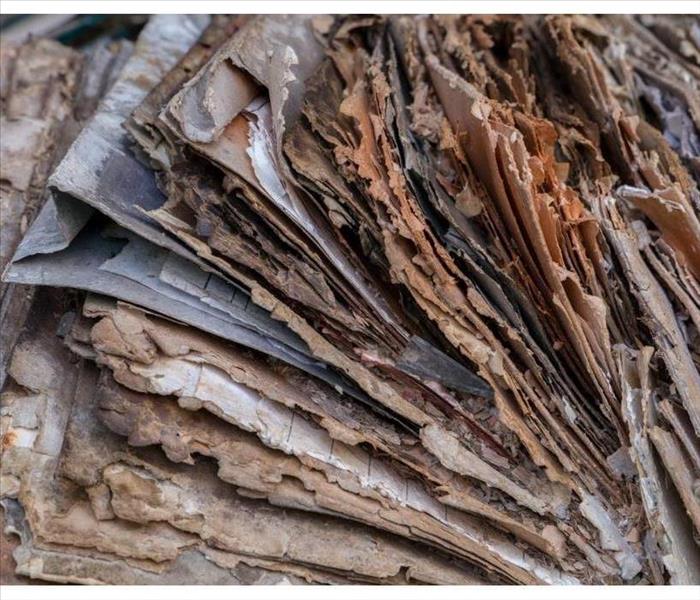 A flood in your business can leave you with wet documents
A flood in your business can leave you with wet documents
Services A Professional Cleaning Service Can Provide
Your Arcadia, OK, business relies heavily on its records and files. If your sensitive documents or photos are only available in paper format, you risk huge losses if a flood damages them. Fortunately, if you act quickly, it is possible to salvage wet documents. Here are some services a professional cleaning service can provide.
Drying
When flooding causes essential papers and files to become water-saturated, it is crucial to undertake immediate document drying measures before irreparable damage occurs. The best way to salvage water-damaged documents is to freeze-dry them by placing them into a cold chamber that turns the water trapped within them into ice. Following this, a vacuum freeze dryer machine turns the ice into a vapor and sucks it out of the document. This method is safest for delicate papers because it does not disrupt the integrity of their fibers.
Sanitization
When flooding occurs, water usually carries and spreads contaminants that can become trapped in paper fibers. In addition to drying your wet documents, a professional flood restoration company will clean away bacteria, mold, or other unsanitary contaminants using Gamma Irradiation techniques that retain the papers' integrity. This cleaning method destroys disease-producing micro-organisms on a cellular level, eliminating their spread and exposure to your employees.
Re-Formating
Having digital versions of your critical documents is one way to keep them from being destroyed by floodwater. A professional document restoration company can transfer your paper records, regardless of age, into digital versions, so that you can avoid losing critical information due to any possible disaster that destroys paper versions. Digital files also reduce the need for physical storage, which creates a potential breeding ground for mold development, even under normal circumstances.
If a flood at your business leaves you with wet documents that contain vital information, contact an Arcadia, OK, restoration company as soon as possible to salvage what you need to keep functioning.
Water Damage Restoration
6/4/2020 (Permalink)
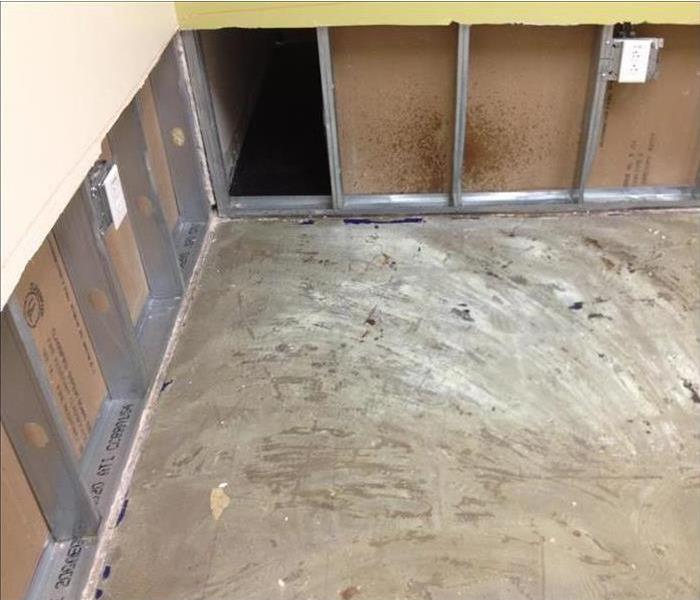 Water damage restoration in Arcadia
Water damage restoration in Arcadia
Water damage to your Arcadia, OK, home can be a major problem. Fortunately, acting quickly can help prevent further damage, including mold growth.
Causes
There are many ways water can damage your home. The following are some of the most common:
- Broken pipes
- Leaking roof
- Storm damage
- Malfunctioning appliances
Homeowner's insurance will cover most types of damage caused by water, but for damage caused by flooding you will need flood insurance. Before any damage occurs, talk to your insurance agent to make sure you have the right type of insurance and the right amount of coverage for your home and belongings.
Restoration Process
If your home suffers water damage, remember that mold can begin to grow within 24 hours. It is important to begin the water cleanup process as soon as possible. First, extract all standing water using a specialized pump or vacuum. If necessary, you can also use buckets to scoop out the water. After this step, there will still be water in porous items, such as carpeting and upholstery. Dry out the remaining water using fans and dehumidifiers. If the humidity outside is low, you can open windows and doors to increase air flow. Next, clean and sanitize all affected surfaces. The source of the water will determine the type of cleaner that you should use. Throw out everything that cannot be fully cleaned and dried. You may need to consult a professional to make this determination. Depending on the extent of the damage and amount of water present, the drying process can take days or weeks. Finally, repair and replace all damaged items. Some repairs you may be able to do yourself, but delicate items, such as antiques and electronics, may need professional restoration.
Cleaning up water damage can be a complex process. If you feel overwhelmed, a certified restoration company can help you get your home back to normal quickly and safely.
Common Water Problems for Commercial Buildings
5/10/2020 (Permalink)
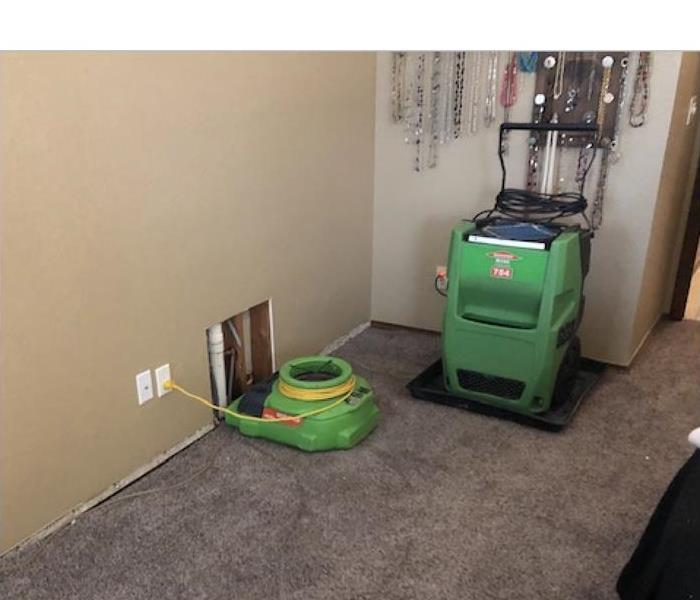 Water cleanup in Waterloo, OK
Water cleanup in Waterloo, OK
Water problems cause millions of dollars of damage every year for businesses. While many categories of damage are covered by a commercial property insurance policy, some areas, such as a flood and a slow leak that could have been stopped, are often not covered. A water leak is one of the most common problems a business in Waterloo, OK, is likely to face. Old or damaged pipes can begin to leak for a variety of reasons. If the leak is in a hard to find spot, such as behind the walls, a large volume of water can escape before it is discovered. The solution is to fix the leak and then consult with a local water remediation company on the best course of cleanup.
Common Water Issues
While damaged pipes in the plumbing system are common, so are a few other water issues. Each one represents a challenge to a company, though some problems are more complicated and expensive than others. The following water issues are likely to be the most common in a commercial building:
- Flooding from a storm
- Sewage backups
- Toilet overflows
- Water irrigation malfunctions
- Roof leaks
- Leaking pipes
The mitigation process for all water damage problems follow a similar process. First is a fast response to stop the source of the leak, followed by an inspection and assessment of the situation. This is followed by water removal and extraction and then drying and ventilation of the affected area.
Complicated Water Problems
If contaminated water is involved, from a source such as a flood or damaged pipes connected to a sewage line, the cleanup requires additional expertise. Not only will the water need to be removed quickly and safely, but all areas in contact with the dirty water will need to be cleaned according to stringent standards. Drywall and carpeting may need to be replaced. A qualified company with trained technicians can take care of even the most complicated water issues your company will face.
4 Things To Do Before The Home Adjuster Arrives
2/18/2020 (Permalink)
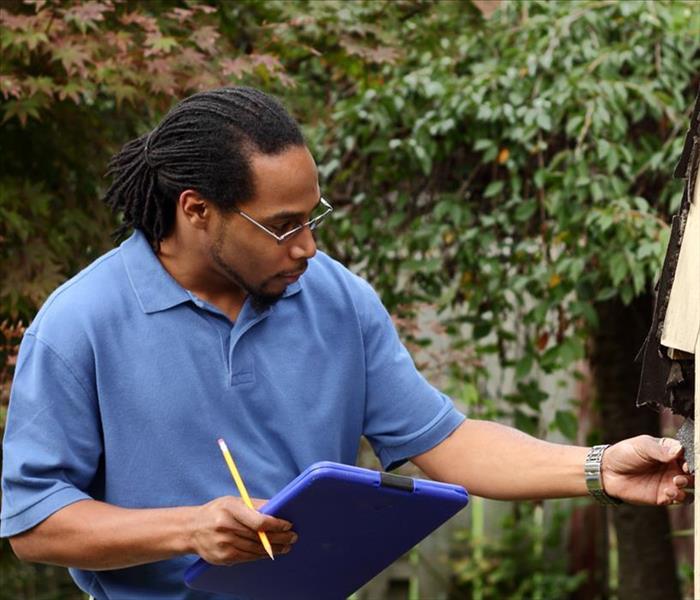 The home adjuster's overview should be easier if you take the time to plan ahead
The home adjuster's overview should be easier if you take the time to plan ahead
4 Things To Do Before The Home Adjuster Arrives
When water saturates your home in Waterloo, OK, you may be able to open a claim, seeking assistance from your insurance company. Before a final decision is made, though, a home adjuster needs to visit, determining the extent of damage and validating your request for repairs. This may seem stressful, but it doesn't need to be. With a bit of preparation and organization, this appointment should go smoothly.
1. Know Your Information
As soon as you can, contact your insurer, informing them about the water damage. They'll have several questions, particularly about how it started, where it occurred and how it needs to be handled. During this conversation, it's best to know your policy as best as possible. Be prepared to answer the following questions about this insurance claim:
- Does the plan include flooding?
- Do you have gradual coverage?
- Is this secondary damage?
- Have you regularly serviced the plumbing?
- Is the utility service at fault for any of the trouble?
Be patient. Keep materials in front of you, and take notes.
2. Photograph Problem Areas
Before anything is fixed, go around the house snapping pictures on your cell phone. Nothing is too small. If it has a sign of penetration or wear, capture it. Download these onto your computer into one file for safekeeping. Print them out for the interview, or email them to the home adjuster.
3. Create an Inventory List
Use your photos to write out your property loss form as well as create an overview for the walk through. If possible, gather old snapshots that demonstrate the area was previously fine.
4. Obtain Quotes
Don't hesitate to have a professional water restoration company inspect the premises, assessing the property's required repairs. These expert opinions may help clarify any confusion about the necessity of replacing certain items. In addition, it's best to secure an electrical inspection at the same time.
The home adjuster's overview should be easier if you take the time to plan ahead. Read up, know your info and record everything.
What Can I Do If a Broken Pipe Flooded the Furnace?
2/3/2020 (Permalink)
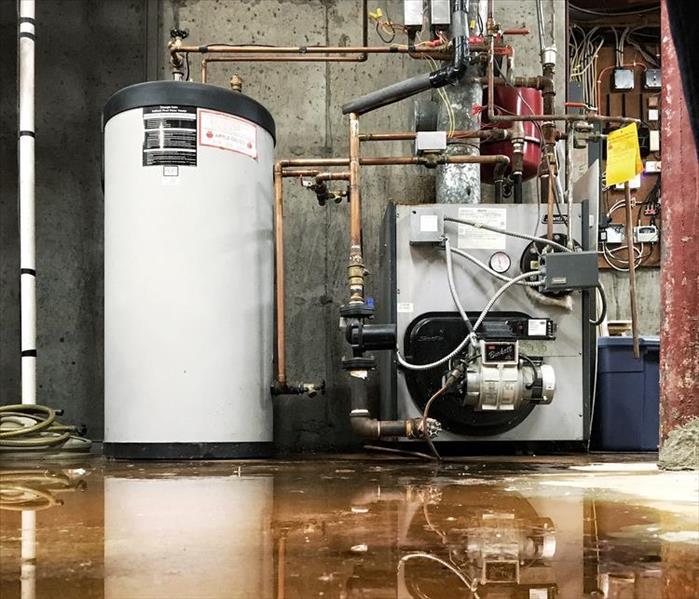 A furnace flood can happen and cause damage in your property
A furnace flood can happen and cause damage in your property
Things That Must Happen To Get Your Business Back to Normal
Although it is not something most people ever consider, a furnace flood can happen, and it can cause considerable damage if not treated promptly. If you find a pool of water around your furnace, you will need to take immediate action to minimize damage to your property. As a business owner in Hibsaw, OK, you may want to hire a professional remediation company to clean up the mess. Here are several things that must happen to get your business back to normal.
1. Stop the Flow of Water The most important thing you can do to minimize the damage from a flooded furnace is to stop the flow of water. You can do this by shutting off the main water valve.
2. Extract the Water Now that you have stopped the water from the furnace flood, you can see how much water there is left to clean up. If it is only a little, you may be able to use a towel or mop to clean up the moisture. However, if it is more than a little, you may need to hire a professional remediation company to extract the water using specialized equipment.
3. Determine the Extent of the Water Damage Water can easily seep between cracks and into porous surfaces. This can lead to problems in drywall, subfloors, and other materials. A moisture meter can be used to identify water inside these areas.
4. Remove Unsalvageable Items There may be some objects that have sustained enough water damage that they will need to be replaced. These items can be identified and removed before the drying process begins.
5. Dry the Area It is important to dry out the area as quickly as possible so that mold does not have a chance to form. Professional drying equipment can be used to speed up this process.
As a business owner, you may want to hire professionals to clean up a furnace flood as quickly as possible. To help avoid this problem from ever occurring, make sure you are maintaining your furnace and performing air duct cleaning.
How To Deal With a Toilet Overflow
1/16/2020 (Permalink)
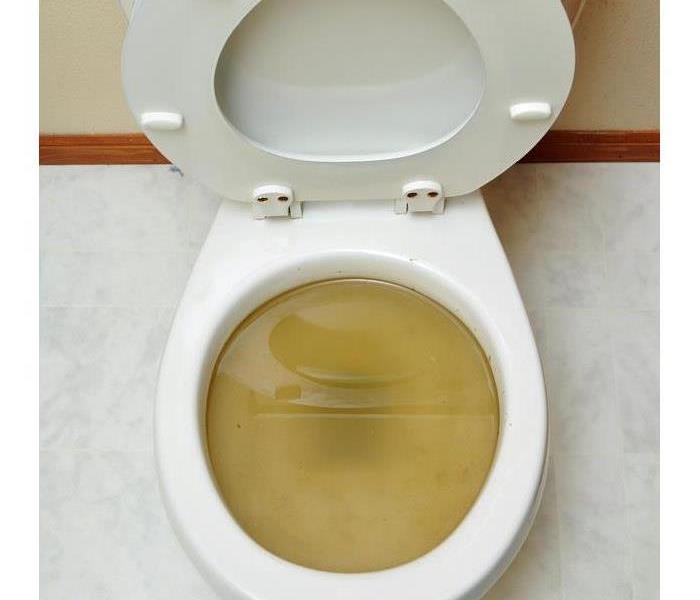 No one wants to deal with a toilet overflow in Edmond, OK
No one wants to deal with a toilet overflow in Edmond, OK
How To Deal With a Toilet Overflow
At one time or another, most people have had to deal with a toilet or sink overflow of some kind. Sometimes, it’s due to a simple clog that is easy to fix. Other times, it can be a lot more overwhelming. If there is sewer damage involved, the impact of the backup can be devastating; it becomes a lot more than a flooded toilet.
What Happens
When there is sewer damage, whether it’s a broken pipe or a clog, the wastewater has to have somewhere to go. If it can’t be drained, it can back up into your residence. This is why you usually end up with a flooded toilet when your sewer has been compromised.
Extra Measures
When the overflow begins, there are a few different tasks that you should put on your to-do list to avoid any further backflow into your home:
- Don’t flush toilets
- Keep running water off
- Turn off water to the building
Following these steps can keep more water from running into your home, which should stop the buildup of contaminated water. The more the water spreads, the more its contaminants get around.
What To Do
The wastewater that overflows into your home due to sewer damage is full of contaminants and toxins that are unhealthy to be in contact with. Unless you have the proper gear and equipment, you don’t want to be inside the flood or clean it up on your own. Often, the first call you need to make should be to your sewage company, and the second call should go to a flood cleanup specialist.
At the end of the day, no one wants to deal with a toilet overflow in Edmond, OK. Hopefully, by being informed and following these tips, you’ll know what to do if your sewer backs up into your house. Visit http://www.SERVPROedmond.com for more information on water damage.
4 Things You Should Not Do If You Have Water Damage
12/6/2019 (Permalink)
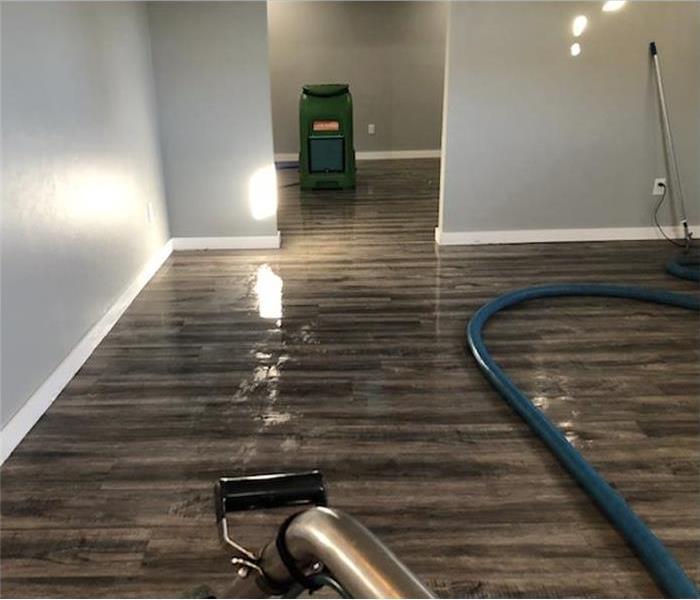 Water damage in Hibsaw, OK
Water damage in Hibsaw, OK
4 Things You Should Not Do If You Have Water Damage
If a broken pipe in your Hibsaw, OK, home has caused water damage to the house, it can be easy to feel flustered and panicked. You might not be thinking clearly in this situation and could make some mistakes when initially reacting. In order to prevent further problems and keep yourself safe, the following are some actions you should avoid.
1. Waiting to Report Damage
The first thing that crosses your mind when you have a broken pipe might not necessarily be to contact your insurance company, but you should do this as soon as you can. The claims process can be lengthy, and you will need the money to help pay for repairs.
2. Throwing Away Affected Items
While it is a good idea to start cleaning up before a home adjuster arrives to inspect the damage, you should not throw away any damaged belongings. These will serve as evidence of your loss and will help the adjuster determine how much you should receive with your claim.
3. Using Electricity
If the damaged pipe has resulted in flooding, then you should be very careful. This can be a dangerous situation, and you should avoid interacting with any of your electronics. Do not try to unplug anything or turn off lights and devices as this can cause a spark. Instead, use the breaker to turn off power to the entire building.
4. Attempting To Do Everything Yourself
Water in homes should be removed quickly to prevent further damage, but you do not need to do this on your own. Moisture can cause mold growth and damage to building materials, so it is important that cleanup is done thoroughly by a professional.
If your home has been damaged as the result of a broken pipe, a cleanup and restoration company can perform mitigation and repairs quickly without sacrificing quality work. They will return your home to its previous condition and have it looking as good as new.
3 Steps To Take When Making an Insurance Claim
10/18/2019 (Permalink)
 If your home in Edmond, OK, was affected by a flood, would you know how to make an insurance claim?
If your home in Edmond, OK, was affected by a flood, would you know how to make an insurance claim?
3 Steps To Take When Making an Insurance Claim
If your home in Edmond, OK, was affected by a flood, would you know how to make an insurance claim? Many homeowners are unsure of how the claims process works, but it's useful to understand what to do when making a claim before a disaster occurs. Here are a few helpful steps to follow when starting out in the claims process.
1. Review Your Policy
After a pipe burst or a sewer backup has caused water damage to your home, it can be useful to review your insurance policy. Many policies will help to cover the costs associated with water damage if the damage occurred suddenly. Home insurance policies generally require insurers to meet a deductible before the insurance company can help cover the damage, though the amount of the deductible can vary from policy to policy.
2. Contact Your Insurance Company
Once you have reviewed your policy, it's usually helpful to contact your insurance company. Most often, the insurance company sends an adjuster to assess the damage. However, when making your insurance claim, your insurance provider may also ask you to document the damage. Photographs and receipts can help to paint a picture of the damage that has occurred in your home, and your insurance company will use this information to accurately cover the costs of the damage after your deductible has been met.
3. Ask for Opinions From Restoration Companies
After you have reviewed your insurance policy and have contacted your insurance company, it's often useful to ask for different opinions from several restoration companies. These professionals can give you an estimate of the cost and an outline of what needs to be done to restore your home. Not all restoration companies are equal, however. It's helpful to work with a flood damage restoration business that can quickly mitigate the damage as well as sanitize, clean and restore your home.
Making an insurance claim is often one of the first steps in the restoration process. Understanding what to do when making a claim can make restoration and rebuilding easier, more time-efficient endeavors.
What To Do When a Toilet Overflows in Your Home
6/12/2019 (Permalink)
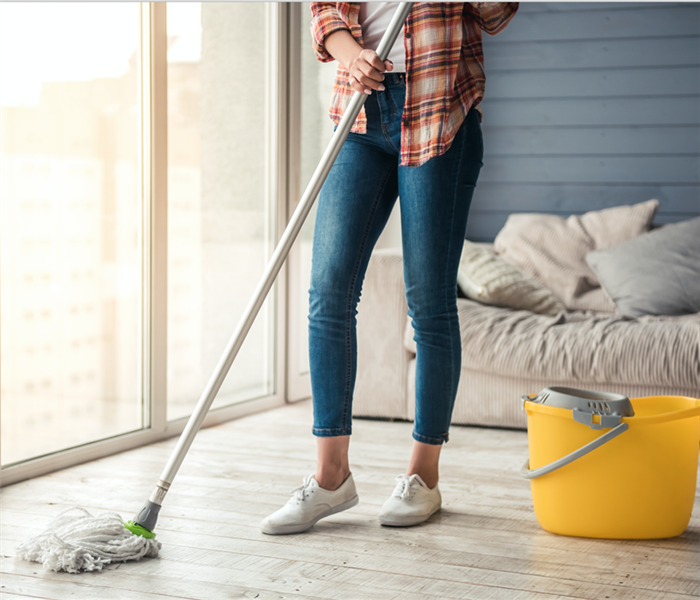 Remove the standing water by using mops
Remove the standing water by using mops
How to React To a Toilet Overflow
Toilet overflows are a common problem that affect many homes in Oklahoma City, OK, throughout the year and often result in sewer damage. It can be useful to know how to react to a toilet overflow before one occurs in your home.
1. Turn Off and Remove the Water
To prevent water from spreading in your bathroom and to other areas of your home, it’s often wise to turn off the toilet’s water supply. Generally, the sooner you can turn off the water supply, the less damage that will occur. Once the water has been turned off, it’s normally best to remove any standing water by using mops or towels. Quickly removing water will make it easier to fix the issue with the toilet and can help to prevent mold growth.
2. Unclog the Toilet
After you have taken steps to prevent sewer damage by turning off the water and drying the floor and area surrounding your toilet, you can shift your focus to unclogging the toilet. You can normally fix a clogged toilet with a plunger, but if your plunger isn’t fixing the problem, you may want to consider using an auger. Generally, your toilet should work normally after it has been unclogged.
3. Know When To Call In Professionals
If you are unable to unclog your toilet on your own, if your flooded toilet has caused major water damage or if your toilet commonly overflows, it may be necessary to contact a sewage company that can help to fix the issue. Additionally, it can be helpful to contact water damage restoration specialists if you suspect that major damage has occurred or if there has been standing water in your home for several days.
Knowing how to react to common problems in the home, such as toilet overflows, is useful for every homeowner. Turning off and removing water, unclogging the toilet if you are able and calling professionals when necessary can help you manage the issue and prevent sewer damage.
How To Prevent Toilet Clogs in Your Building
4/19/2019 (Permalink)
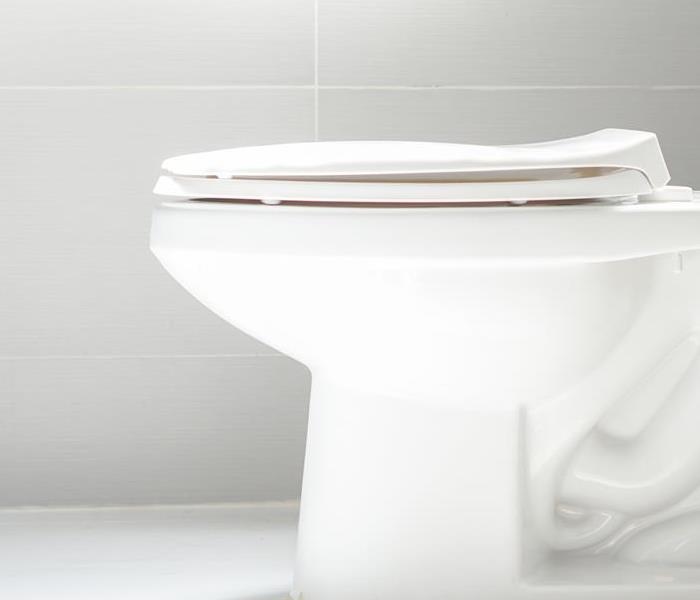 A clogged toilet in a public restroom can make a big mess.
A clogged toilet in a public restroom can make a big mess.
A clogged toilet in a public restroom can make a big mess. It can flood the whole room, rendering it useless until the problem is fixed. It can even seep into the tiles and flood the next level down if it goes unchecked for long. If your building in Edmond, OK experiences frequent flooding from toilets, there are a few things you can do to reduce the number of occurrences.
Timely Maintenance
There are several reasons a toilet might leak:
- Too much toilet paper
- Unflushable items in bowl
- Clogged pipes
- Loose gaskets or seals
Any time you have a toilet overflow, you need to call sewer remediation specialists immediately. These experts can tell you if your problem is an actual clog or simply the result of improper usage, and they can clean up the mess quickly either way.
Helpful Signage
Many people don’t realize how easily a clogged toilet can occur in a building with multiple restroom facilities. They may presume that public toilets are somehow more powerful than residential ones, or they may not know where to dispose of various items. By putting up signs in the public restrooms with helpful reminders of how not to cause an overflow, you can inform employees and visitors of sensible expectations.
Disposal Options
You have some control over the level of trash that ends up in the toilets in your building. Thinner toilet paper reduces the likelihood that a visitor will use too much and cause sewage to flow over the rim of the toilet when it is flushed. One trashcan per bathroom is not sufficient. If you want people to dispose of larger items responsibly, you must provide them the means to do so. Place trash receptacles in each stall or along the walls of the restroom.
You cannot control other people’s behavior. You can, however, provide the guidance and the means to execute proper restroom etiquette and avoid a clogged toilet.
Common Water Heater Cleanup Procedures
3/19/2019 (Permalink)
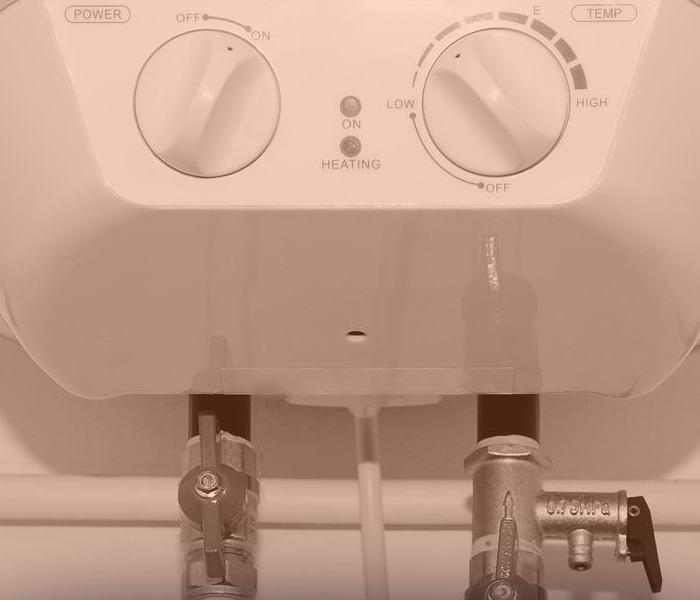 A leaking water heater in your home in Edmond, OK can cause a range of problems.
A leaking water heater in your home in Edmond, OK can cause a range of problems.
Common Water Heater Cleanup Procedures
A leaking water heater in your home in Edmond, OK can cause a range of problems in your home, and it can be stressful not knowing how the issues will be resolved. However, you can feel more prepared for the cleanup process by understanding what it involves.
1. Assess the Damage
An assessment of the damage is often the first necessary step to take after your broken water heater has flooded part of your home. Since a water heater holds such a large amount of water, a large amount of space can quickly become affected by the flooding in order to proceed in the cleanup process. Any hazards need to be eliminated before the next step occurs.
2. Remove the Water
After the damage has been assessed, water will be removed from the home. Although clean water is easy to remove from a home, if water from a leaking water heater is left standing, it can quickly become contaminated, and contaminated water often requires special equipment to remove. Water damage restoration experts will know how to safely remove the water without causing harm to themselves or damaging additional items or areas in the home.
3. Sanitize, Restore and Replace
After the damage has been assessed and water has been removed from your home, the area affected by the failed water heater will be thoroughly sanitized. Certain items, such as furniture or floorboards, may be restored. However, items that are more delicate cannot always be restored if they have been badly damaged and are not quickly removed and dried, especially if they are affected by mold growth.
It’s not always possible to prevent flooding from a broken or leaking water heater, but knowing common procedures, such as assessing damage, removing water and sanitizing and restoring or replacing items, can give you a better idea of what happens in the cleanup process and why.
Your No-Fuss Guide to Fixing a Flooded Basement
1/17/2019 (Permalink)
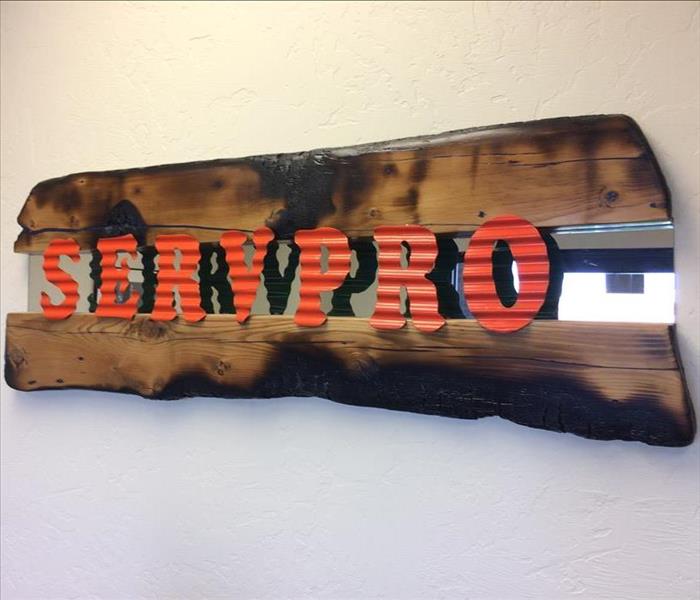 Severe floods require the assistance of SERVPRO in Arcadia, OK
Severe floods require the assistance of SERVPRO in Arcadia, OK
If you own a home in a region that sees an inordinate amount of rain, then there is a good chance that you have had to deal with a basement flood. Even if you have the proper measures in place – one such measure being a sump pump – it is not unheard of for said measures to fail, especially when there is a significant amount of water. That said, if your basement suddenly becomes a swimming pool, you don't have time to wonder about how it happened. Rather, you need to act fast and start drying it out asap. Reactive measures you should take include the following:
- Remove the water from the flooded basement before you enter.
- DO NOT attempt to salvage electrical or gas appliances.
- Take measures to prevent future occurrences.
Remove the Water
If the basement flood is shallow, you may be able to use a shop vac to suction the sitting water off the basement floor. However, if the water is deep, do not attempt to go in the basement yourself. Such a severe flood requires the assistance of a Arcadia, OK, water removal company that has the equipment and training necessary to work under such dangerous conditions.
Hush Your Inner Penny Pincher
You may have paid a month's wages for your washing machine and another two week's wages for your dryer, but if the motor or electrical components of either get wet, don't try to salvage them. Yes, it will hurt to let them go, but it may hurt you even more to try to continue using them once damaged.
Be Proactive
There's a lot you can do to prevent future flooding. Install interior and exterior drains, invest in a backup sump pump and buy a generator to keep your pumps working when the power goes out. Taking proactive measures can not only save your basement, but it also may help lower your insurance coverage rates.
Dealing with one basement flood is no fun. Dealing with two can be downright frustrating. Talk to your Arcadia, OK, water damage restoration team regarding measures you can take to restore your home and prevent future flooding.
3 Ways To Prevent Water Damage While On Vacation
12/30/2018 (Permalink)
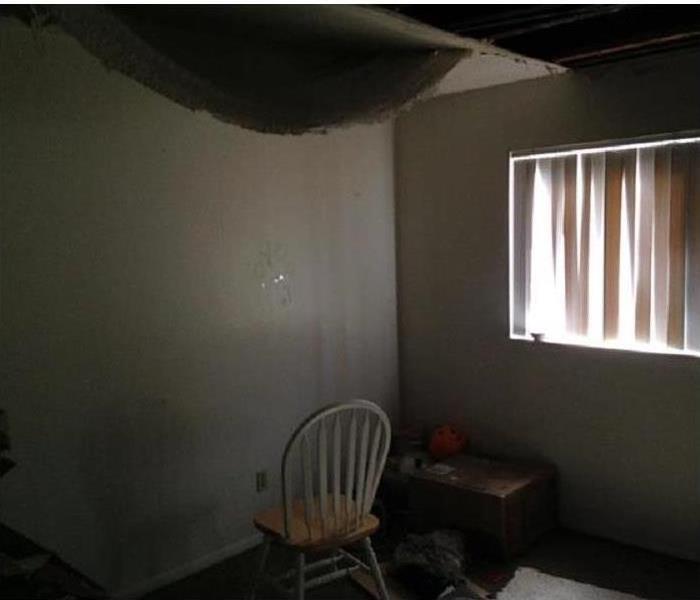 Water damage and collapsed ceiling in Edmond, OK
Water damage and collapsed ceiling in Edmond, OK
Three Preventative Measures Before Leaving Home
A broken pipe, appliance leak, or flooding can cause water damage while you are away from home. If this occurs, it may be some time before you can schedule water pipe repair. A few simple steps can limit the extent of damage to a residence in Edmond, OK. Take these three preventative measures before leaving home.
1. Check For Leaks
Inspect pipes, water hoses connected to major appliances, and the water heater for any visible signs of leaks. Keep an eye out for condensation, cracks, or rust. Make sure that no shingles on the roof are damaged or out of place.
2. Shut Off Water Valves
The easiest way to limit the extent of damage due to a broken pipe or appliance malfunction is to turn off the water supply. Shut off the main and then drain pipes by running water and flushing toilets. You can also turn off the water supply valves on appliances. This may prevent the need for water pipe repair immediately upon your return.
3. Test the Sump Pump
Fill the sump pit with water to make sure the pump drains. Check the power source and clear debris out of the intake screen, pit, discharge pipe, and vent hole. You may also want to install a battery-powered backup to prevent pump failure and avoid a flooded basement in the event of a power outage.
Homeowners may also want to clear gutters, insulate exposed pipes, and leave cabinets containing plumbing open to allow air to circulate. Maintain an interior temperature of 50 to 55 degrees Fahrenheit to keep pipes from freezing. It is a good idea to have someone you trust check in on your home. If your residence sustains water damage while you are away, schedule water pipe repair and a consultation with a water damage restoration company as soon as you return to Edmond, OK.
What to do when water damages your home?
12/7/2018 (Permalink)
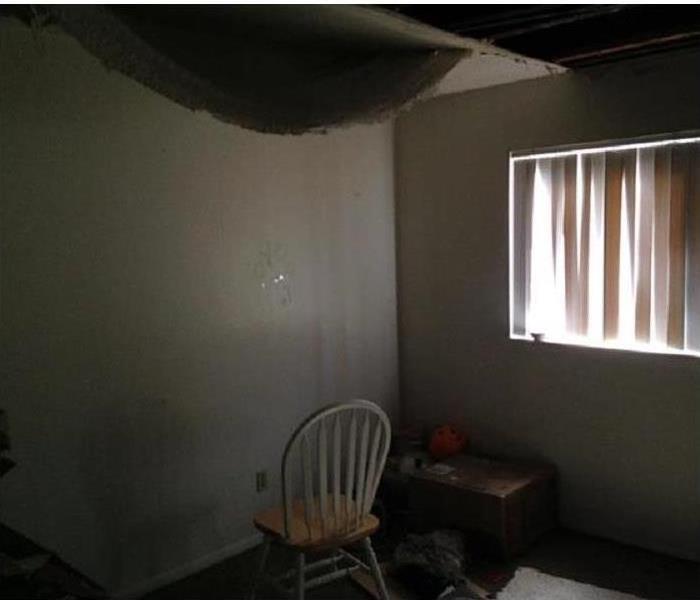 Water damage due to broken pipe in a Edmond,OK home
Water damage due to broken pipe in a Edmond,OK home
Water Damage in Your Home
Water damage from a broken pipe or a natural disaster creates a huge household mess. Aside from the material cost, there may be health factors involved that make it impossible for you to clean up the house yourself. It’s critical to save what you can, but concede that many items will need to be replaced. Take some time to survey the water damage before jumping in to save that old photo album.
Electrical Safety
Even if you have a fine film of water on your interior floor, avoid walking in the house until you turn off the power. Water is a perfect conductor for electricity, making the entire home a potential shock hazard. Shut off the power at the main panel to avoid any electrical injuries. If you can’t reach the panel, an electrician will need to come in and shut it down manually.
Evaluate Damage
Avoid diving into the water damage, but actually evaluate each room visually. Note down all the damage to the house itself and belongings. Take photos if possible for insurance purposes. If you have a drawer of important papers, try to access this information first before any more water damage destroys the information. You’ll need your insurance information to make a solid claim. The evaluation also gives you an idea of the types of professionals necessary to fix the problems.
Contact Cleaning And Insurance Professionals
Call your insurance provider to send an adjustor out to the home. Consider cleaning professionals in your area that specialize in water damage. Ask friends and family about their experiences. You need professionals that understand the corrosive behavior of water and its effects. Companies without this expertise often overlook areas, creating havens for more water damage and mold growth
Water damage in Edmond
12/7/2018 (Permalink)
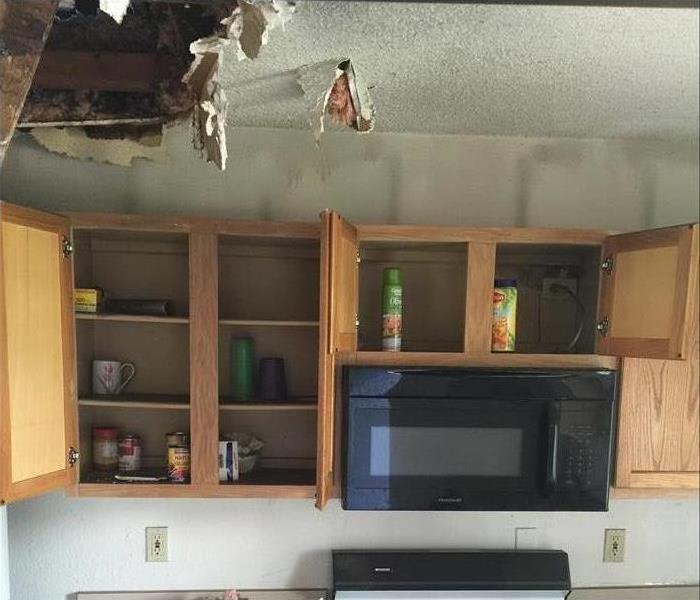 Water damage due to a leak pipe on the second floor in a Edmond,OK home
Water damage due to a leak pipe on the second floor in a Edmond,OK home
Flooding, plumbing leaks and water damage in Edmond Oklahoma can happen at any time. Internal and external forces can harm valuable items, carpets, furnishings and structural components. Even in a well-maintained building, pipes can break, toilets can overflow and water can seep behind walls and under floors. Waterlines for refrigerators often create concealed leaks that go unnoticed until mold and mildew have accumulated behind the appliance. The same is true for washing machine hoses that have cracked or become clogged. Water damage can also occur after a violent storm, a flood or several days of steady rain. Basements and lower levels are especially prone to this type of damage.
Water Damage Statistics
Any type of leak can cause property damage and create safety and health concerns. It's easy to think that water damage or storm damage won't happen to you, but statistics say otherwise. Water damage is among the most common causes of property insurance claims. One in every 55 homes will have a water-related property damage claim this year. While you cannot stop a storm, you can follow these steps to prevent water damage in Edmond Oklahoma.
Kitchens and Bathrooms
Kitchens and bathrooms are susceptible to water damage due to the amount of plumbing in these areas. Fix leaking or dripping pipes promptly, and be aware of elevated humidity levels that could indicate an underlying plumbing problem. Maintain caulk around showers and bathtubs. Water that passes through gaps can penetrate walls and subfloors. If this sealant has cracked or separated, have it repaired. You can probably complete that task yourself.
Appliances
Inspect waterlines for appliances at least once per year. If hoses are brittle, cracked or crimped, replace them before they fail. Turn off the water supply for all appliances before traveling out of town. Pay special attention to hoses for washing machines, refrigerators and ice makers. Since washing machines have inlet hoses and drains, they are especially prone to leaks.
Protecting Pipes
Protect plumbing from freezing by insulating pipes that travel along exterior walls or through unheated crawlspaces. On cold nights, open cupboard doors, and let faucets drip. Before winter, drain all watering hoses, and turn off valves for exterior faucets. If a pipe does freeze, don't thaw it too quickly. That's how pipes burst. To protect your plumbing, never set the thermostat below 55 degrees. If an emergency does occur, follow these steps.
• Turn off the water supply immediately. Call your utility company if necessary.
• Use mops and towels to remove as much water as possible.
• Turn on fans, dehumidifiers or air conditioners to remove excess moisture.
• Use wood blocks or tinfoil to elevate furniture from wet surfaces.
• Remove area rugs, table lamps and colored items to prevent staining and to help dry the underlying surface.
• Place wet sofa cushions and upholstered items on end for faster drying.
• Never use ceiling lights, TVs or appliances in waterlogged areas.
• Remove books, magazines and items that may bleed or stain.
• Stay out of areas where ceilings are sagging.
By taking preventive measures, you can minimize the likelihood of water damage in Edmond Oklahoma affecting your home. You can also lessen the severity of the water damage by following these tips. If you do experience water damage at your home or business, respond quickly, and call a professional to handle the situation.
SERVPRO of Edmond Professionals provide fire and water damage restoration services. SERVPRO of Edmond proudly serves Oklahoma City, Tulsa, Edmond, Stillwater, Yukon, Bethany, Mustang, Moore, Guthrie, Choctaw, and surrounding areas. We are available 24 hours/7 days a week and are ready to restore damage to your home or commercial structure.
Water Damage Restoration
Basement flooding or storm damage doesn't wait for regular business hours and neither do we. We respond to your residential or commercial water removal and cleanup needs. Our fast response time and advanced drying methods help prevent secondary damage and mold. Common causes of water damage are:
Does Homeowners' Insurance Cover Broken Pipes?
10/9/2018 (Permalink)
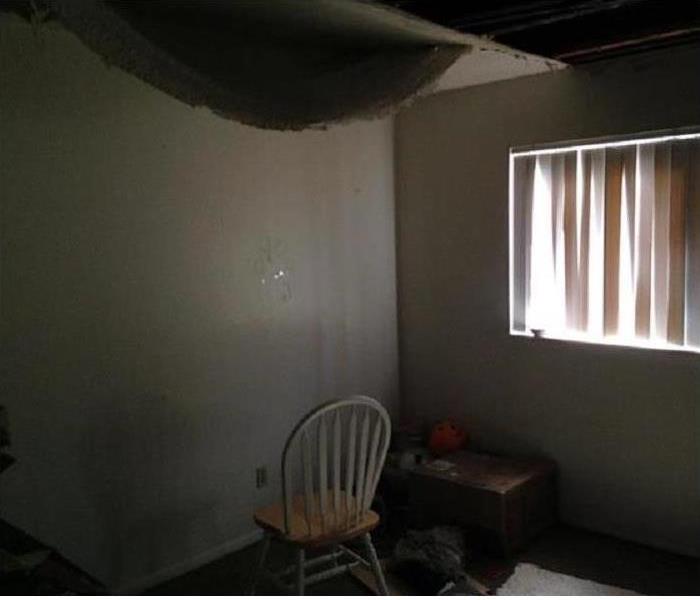 Ceiling damage from a broken pipe in a Edmond, Ok home
Ceiling damage from a broken pipe in a Edmond, Ok home
An all-perils homeowner's policy provides a wide range of coverage for your home. These policies may not cover issues that result from a lack of normal maintenance. Even if your policy does not cover the cost to fix broken pipe, it should offset the restoration of water or flood damage caused by a burst. Find out more about what probably is and is not covered by homeowners' insurance.
A Broken Pipe
Most homeowners' policies consider plumbing problems preventable with regular maintenance. Schedule inspections to prevent your claim from being rejected on the basis of indications of negligence such as
- Old or damaged plumbing
- Signs of corrosion or rust
- No recent inspections by licensed professionals
- Lack of preventative measures such as heating your home or dripping faucets
If you can prove that you have done everything you can to prevent a pipe break, you may be able to file a successful claim. Even if your policy will not pay for the burst, flood or water damage from a broken pipe is usually covered.
Water Damage
Act quickly to mitigate damage to increase the chances of your claim being accepted. Shut off the water supply and collect as much water as possible. Contact a plumber to fix broken pipe and a restoration service.
A pipe burst usually causes Category One water damage. There are several categories that require more or less extensive cleanup.
• Category One water is clean and treated
• Category Two water may contain chemicals or microbes
• Category Three water contains solid waste
Water from a pipe break can develop into Category Two damage if you wait too long. You can increase the likelihood your insurance coverage will pay for your claims by gathering evidence that you have done everything in your power to limit flood damage. Start by contacting a plumber and professional water damage restoration service in Edmond, OK.
6 Steps To Remedy a Basement Flood
6/22/2018 (Permalink)
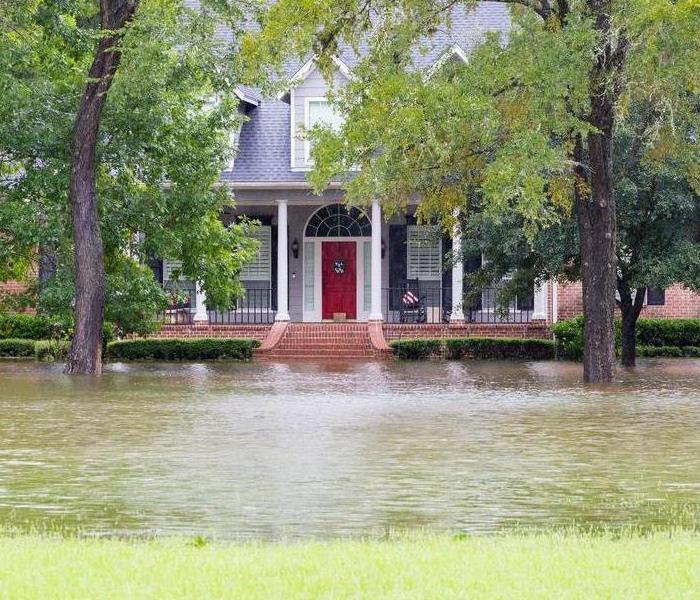 Flooding can be terrifying, but taking proper steps to mitigate the problem can make the flood seem instead like it was just a puddle.
Flooding can be terrifying, but taking proper steps to mitigate the problem can make the flood seem instead like it was just a puddle.
A surprise can be good, but flooding is a shock no homeowner in Edmond, OK, wants. This is especially true in the case of a basement flood. Following these six steps can stop the flood from becoming much worse than it should be.
1. Turn Off Electricity
Electricity is dangerous if left on before inspecting. For safety, it’s important to never enter a flooded area with electricity still flowing. If you are not comfortable with cutting off the power to the area, consult an electrician to assist you.
2. Ensure the Water Source Stops
If the damage is from a natural flood or storm, the area should not be accessed until the flooding subsides to avoid becoming trapped underwater. If the basement flood is from a broken pipe or utility, turn off the water line to the basement as soon as you can to stop water flow.
3. Protect Yourself
No matter how safe the water initially was, it could become contaminated. Wearing gloves, boots and a mask are effective ways to protect yourself. The area is damp, so wet surfaces are also a slipping hazard to be mindful of.
4. Check the Drain
Most basements have a flood drain for these situations. If the water is not subsiding, the drain needs to be unclogged to become functional again.
5. Relocate Damaged Items to Dry
Nonelectrical items need to be removed from the damp environment of the basement to dry. Natural sunlight can dry them well. If an item remains damp after a few days, it may need disposal to avoid mildew and mold. Wet cardboard is ideal for bacteria and should be thrown out.
6. Treat the Damage
Residual water needs to be removed from the room to stop damage from worsening. Carpet cleaning and drying are standards procedures. Without assistance from others or proper industry-grade tools, it is more worthwhile to contact a water removal and restoration service.
Flooding can be terrifying, but taking proper steps to mitigate the problem can make the flood seem instead like it was just a puddle. For more information, visit http://www.SERVPROedmond.com/.
Which Restoration Company to Choose?
2/18/2018 (Permalink)
There are many home restoration companies
Most are reliable and will arrive at you property promptly to evaluate the storm damage and begin storm remediation. These professionals will work with you to create a customized home restoration plan to get your home environment back to normal.
It is important to do some research and find storm restoration company with experienced technicians. Highly skilled professionals can address roof damage issues, provide roof repair, handle ice dam and ice damming problems and take care of ground water problems promptly.
Removing ground water with flood pump is critical when starting storm remediation. Using flood pump, professionals will get rid of ground water and flood water. They will also evaluate the roof damage and provide roof repair in order to protect the home and prevent further damage. During severe flooding or river flood homes can be seriously damaged. It's important to choose the right company for the job.
For more information visit www.SERVPROedmond.com.
Be careful of frozen pipes this winter
12/15/2017 (Permalink)
Don't Let Your Water Pipes Freeze This Winter
Everyone has had it happen. It's a cold day. You switch on the tap, and there's no water. Frozen pipes are frustrating. Then, you have to worry about how quickly they'll thaw out and what will happen when they do. As Oklahoma City temperatures drop, the likelihood of pipes freezing and water damage increases. It could happen at your home or your business, and it will probably occur at the most inconvenient time. Fortunately, there are measures that you can practice to protect your pipes from freezing weather. Oklahoma City gets less freezing weather than other parts of the country, but it is a real concern in Edmond.
Insulating water pipes is an excellent long-term solution to prevent Tulsa water damage. Pipe blankets should be installed on hot and cold water lines. They block condensation and keep pipes from freezing. Pipe wraps also prevent heat loss, so they can save energy and help you reduce water heating costs, during those cold spells in Edmond, OK.
Weatherizing your home is another way to save energy and protect your pipes from water damage. Insulate crawlspaces. Install vapor barriers, and caulk small cracks and gaps where cold air enters. Pay extra attention to areas where pipes and utility lines pass through the foundation.
Good habits will also keep your pipes safe on the coldest nights. Listen to local weather reports for the greater Oklahoma City area. If temperatures are anticipated to drop below freezing, prepare your plumbing for the cold weather.
Opening your faucets during cold weather is one of the most effective and dependable ways to prevent frozen pipes and water damage. Ordinarily, you'll have the best results if you turn on faucets that are furthest away from the water main.You might also want to turn on faucets in cold areas that are prone to freezing in your Stillwater neighborhood.
Pipes that pass through crawlspaces, cupboards and unheated areas are especially vulnerable. You can buffer temperatures by opening cupboards under sinks in kitchens and bathrooms. On extremely cold nights, you can protect your plumbing by covering crawlspace vents and reopening them the next day.
If your pipes do solidify, it's important to follow the correct thawing procedure. Always open the tap before warming the area. Never pour hot water over pipes or use direct heat sources. Burst pipes are caused when steam builds up as the blockage thaws. Then, you have to deal another problem and call a professional to repair the pipe and clean up the mess from water damage. If a pipe does burst this winter, our SERVPRO of Edmond water damage specialists can help provide fire and water damage restoration services.
What Should You Do When Your Building Is Contaminated With Black Water?
11/29/2017 (Permalink)
What Should You Do When Your Building Is Contaminated With Black Water?
Not all water damage is created equal, and what remediation steps you take all depends on the original source of the water that flooded your Edmond, OK building. Clean water is precisely what it sounds like: water that does not pose any immediate health threats and that comes from broken water lines, toilet holding tanks, rainfall and snowmelt. If not treated in time, clean water can become gray water, which is water that does contain some contaminants. Gray water can include discharge from showers, sinks, aquariums, water beds and dishwashers. Then there is black water, or floodwater.
What Is Floodwater?
The water that enters a building during a flood usually contains dozens of harmful contaminants, which is why it is so important to work with a professional water remediation team after an incident. Floodwater usually contains soil, which can contain feces, pesticides and other contaminants, natural or not. It can also contain sewage runoff, which may be contaminated by bacteria, molds, fungi, protozoans and viruses.
Contamination can occur anytime, both during the flooding incident and afterwards. For this reason, it is imperative to your health and the health of all your employees and customers that you work with a professional water remediation team after a flood.
Why Work With a Professional Water Remediation Team?
Water damage is one of many major concerns after your building floods. Though a water remediation company will do everything possible to restore your building to its pre-flood condition, its main goal will likely be to free your building of any remaining contaminants. Don’t attempt to clean up post-flood on your own; instead, turn to a professional restoration team for help. Visit http://www.SERVPROedmond.com for more information on water damage.



 24/7 Emergency Service
24/7 Emergency Service
































